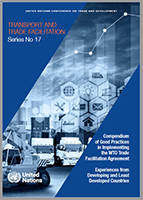
The high cost of doing business is often one of the major challenges in developing and least developed countries. Trading across borders is no exception. This includes high transaction costs, complex trading procedures, excessive documentation, inadequate and inefficient infrastructures leading to high transportation costs, and a lack of transparency and good governance which, in many cases, facilitates corruption.
The World Trade Organization Trade Facilitation Agreement (TFA) that entered into force on the 22 February 2017 addresses many of the challenges in cross border trade by providing a framework of trade facilitation regulations that, if implemented by WTO member countries, will assist to boost international trade, and also contribute to meet the 2030 Sustainable Development Goals.
Given the multi-stakeholder nature of trade facilitation, implementation of the TFA obligations usually requires the involvement of multiple government agencies as well as the private sector. This is by no means a straightforward process. The TFA has foreseen this complication by making the establishment of a National Trade Facilitation Committee obligatory (Article 23.2 of the TFA) in each of the TFA’s signatory countries with a view to undertaking this coordination role. Moreover, in many cases technical and/or financial assistance is needed for the implementation in developing and least developed countries, an issue which is addressed in Section II of the TFA under the heading of Special and Differential Treatment.
This is in line with the unified mandate bestowed upon UNCTAD by the Maafikiano decision that cut across divisional boundaries and focuses on the implementation of the 2030 Agenda alongside the four principal SDGs of: equality; growth; multilateralism for trade and development; and productive capacities for structural transformation. It is heartening to see that a number of these countries have progressed the implementation of the various TFA measures, particularly considering the implementation challenges faced by developing and least developed countries.
With this in mind and with a view to sharing such experiences, UNCTAD, with inputs from developing and least developed countries, has compiled a first volume of Compendium of Good Practices on the Implementation of the TFA.
The Compendium is intended to inspire policymakers to implement various measures drawing on experiences that have been tried and tested elsewhere. These good practices not only present the implementation activities but also the challenges faced in their development and execution, as well as the key factors for a successful outcome. The intention is to help transfer the experience and lessons learned so that others can avoid common pitfalls and achieve results more efficiently.
The Compendium aims to eventually cover all measures under the TFA. This first volume includes measures such as Publication and Information Available through the Internet; Pre-Arrival Processing; Electronic Payment; Risk Management, Single Window, SPS related measures and National Trade Facilitation Committees.
Following this, other volumes will be published with a view to having at least one country example for each of the measures of the TFA, and additional examples will be added over time.




